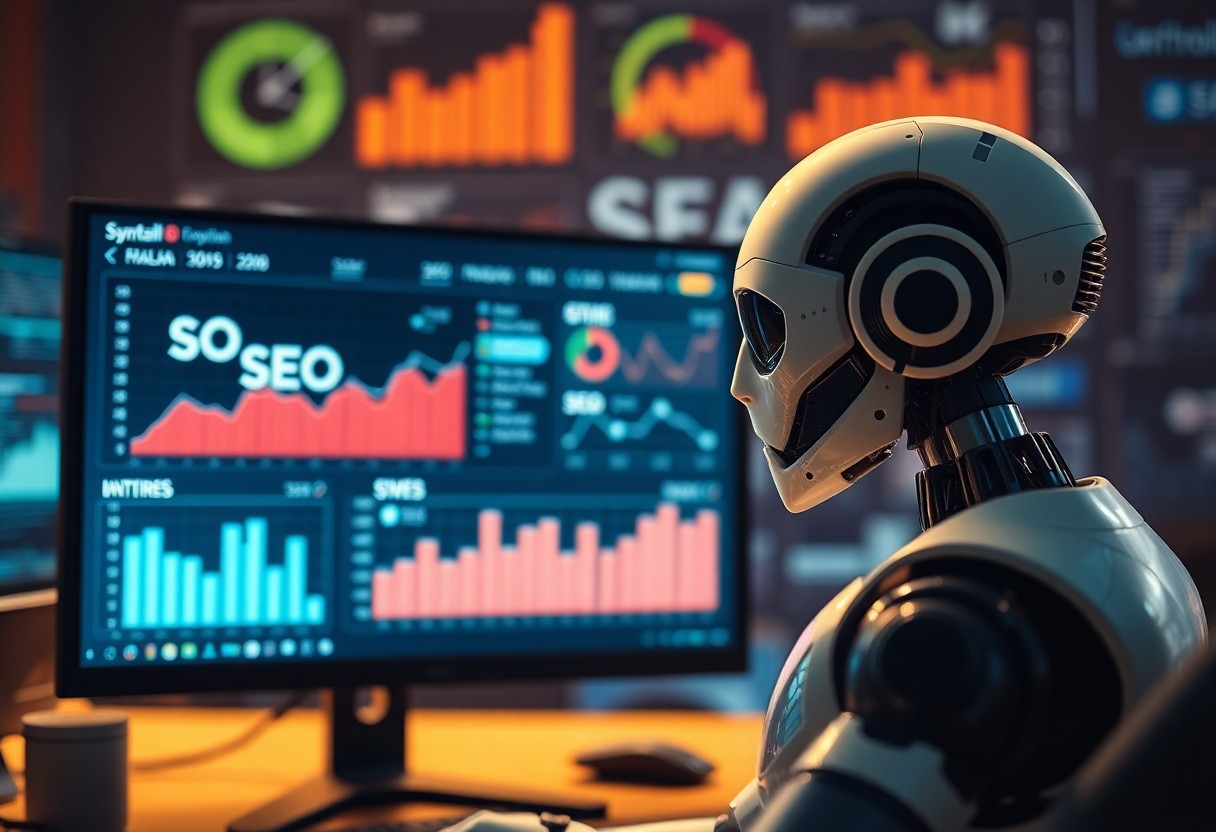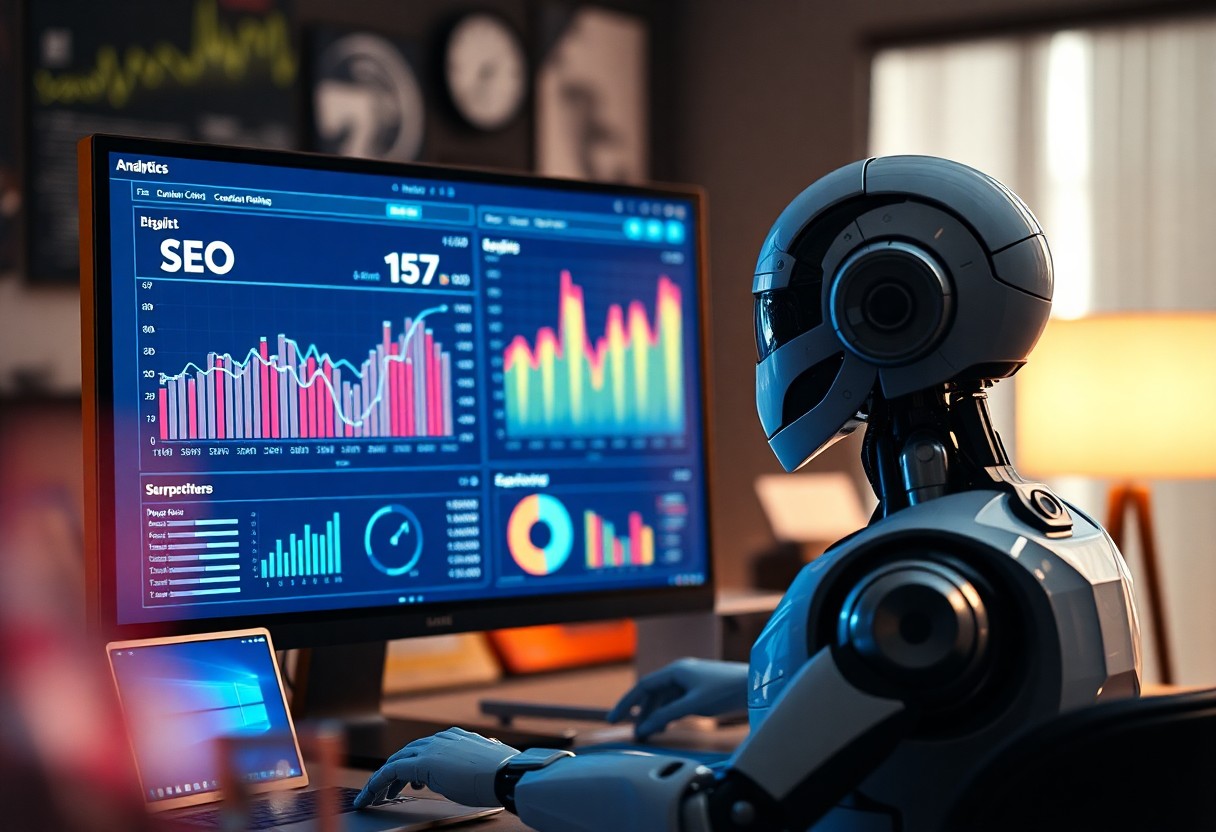
AI for SEO
With the rapid evolution of digital marketing, understanding how to utilize artificial intelligence for SEO can significantly enhance your website’s visibility. This guide will equip you with 12 innovative AI strategies that can optimize your content, improve keyword research, and streamline your link-building efforts. By integrating these tools into your SEO tactics, you can outperform your competitors and achieve long-term online success. Embrace these technologies to stay ahead in the ever-changing landscape of search engine optimization.
Understanding AI in SEO
Before you can harness the power of AI for your SEO strategy, it’s necessary to grasp its core components. AI, or artificial intelligence, encompasses a range of technologies designed to enable machines to mimic human behavior. In the context of SEO, this refers to algorithms and tools that analyze data, predict trends, and personalize user experiences to enhance search engine performance.
Definition of AI
After exploring the landscape of SEO, you should recognize that AI is the simulation of human intelligence processes by machines, especially computer systems. This involves learning, reasoning, and self-correction, allowing tools to analyze vast amounts of data and derive actionable insights that can optimize your marketing strategies.
Role of AI in Search Engine Optimization
Behind every effective SEO strategy today, you’ll find AI working quietly to enhance efficiency and effectiveness. AI streamlines the optimization process by providing valuable insights, automating repetitive tasks, and analyzing user behaviors. This not only saves you time but also allows you to tailor your content more closely to your audience’s preferences.
To fully harness AI’s potential in SEO, you should understand that it enables sophisticated data analysis, improving your site’s visibility and performance. AI tools can predict search trends and user intent, ensuring that your content is both relevant and engaging. Additionally, machine learning algorithms can adapt to ever-changing search engine guidelines, helping you stay ahead of competitors. However, you must be cautious about over-reliance on automation, as misused AI can lead to misleading interpretations of data. Striking a balance between human creativity and AI efficiency can yield remarkable results for your SEO efforts.

Key AI Technologies for SEO
The integration of AI technologies in SEO is a game changer, enhancing your ability to optimize content and improve search rankings. Key technologies like Natural Language Processing and Machine Learning Algorithms allow you to analyze user behavior, understand search intent, and automate processes, leading to more effective strategies and increased visibility on search engines.
Natural Language Processing
Along with advancing search engine algorithms, Natural Language Processing (NLP) enables machines to understand and interpret human language. This technology helps you create content that resonates with your audience by analyzing sentiment, keywords, and context, thereby improving your content relevance and engagement.
Machine Learning Algorithms
Above all, Machine Learning Algorithms play a significant role in SEO by identifying patterns in user interactions and search behaviors. These algorithms constantly evolve, allowing you to refine your strategies based on real-time data and insights, enhancing your chances of ranking higher on search engine results pages.
Even more fascinating, Machine Learning Algorithms can predict emerging trends and optimize your content accordingly. By analyzing vast datasets, these algorithms help you tailor your SEO strategies, ensuring you stay ahead of your competitors. As you harness their power, you may also face challenges; data bias can lead to controversial outcomes, while algorithm changes from search engines can disrupt your rankings. Embracing this technology requires you to stay vigilant and continuously adapt your tactics to maintain effective performance in the dynamic SEO landscape.
Benefits of Using AI for SEO
If you want to stay ahead in the competitive landscape of digital marketing, leveraging AI for SEO can transform your strategies. AI tools enable you to analyze massive datasets quickly, identify trends, and automate repetitive tasks, significantly enhancing your efficiency and effectiveness in optimizing your online presence.
Improved Keyword Research
Across various industries, AI technology streamlines the keyword research process by analyzing user intent and search behavior. This capability helps you uncover long-tail keywords and phrases that are less competitive yet highly relevant to your audience, enabling you to craft targeted content that attracts qualified traffic.
Enhanced Content Creation
Among the many advantages AI brings to SEO, enhanced content creation stands out. By utilizing AI-driven tools, you can generate high-quality content that resonates with your target audience while adhering to SEO best practices.
Indeed, AI can analyze existing content and determine what works best for your audience, allowing you to create engaging, relevant, and optimized articles, blog posts, and other materials. AI tools can suggest topics, optimize for search intent, and even improve readability, leading to better user engagement and higher conversion rates. This not only saves you time but also ensures you are producing content that meets the evolving needs of your audience efficiently.

AI Tools for SEO Optimization
Unlike traditional SEO methods, AI tools leverage advanced algorithms and machine learning to enhance your website’s visibility and optimize content. These tools can analyze vast amounts of data, identify trends, and suggest actionable insights, allowing you to make informed decisions to boost your search engine rankings. By automating repetitive tasks and providing personalized recommendations, you can focus more on strategy and creativity, ultimately leading to improved SEO performance.
Popular AI Tools Overview
About the landscape of AI tools for SEO, you’ll find a variety of options designed to support different aspects of optimization. Tools like Surfer SEO assist in content creation by analyzing top-performing pages to provide guidelines on word count, keyword usage, and structure. Alternatively, MarketMuse helps improve content quality by identifying knowledge gaps and suggesting relevant topics, while Ahrefs offers powerful backlink analysis and keyword research capabilities. Your choice among these tools can significantly influence your SEO strategy.
How to Choose the Right Tool
Any effective SEO strategy starts with selecting the right AI tools that fit your specific needs. Consider your primary objectives, whether it’s content creation, link building, or keyword analysis, and explore tools that specialize in those areas. Look for user-friendly interfaces and robust customer support, ensuring you can maximize the tool’s potential. Assess features and pricing to find a balance that suits your budget and goals.
Right now, as you evaluate options, focus on tools that align with your business needs and offer integrations with existing systems. Prioritize user reviews and case studies to gauge effectiveness, and consider testing out trial versions before committing. Keep in mind that the ideal tool should not only provide powerful features but also enhance your workflow and save you time, paving the way for better SEO results.
Case Studies: Success Stories with AI in SEO
Once again, the integration of AI in SEO has proven to drive remarkable results. Various industries have leveraged AI tools to optimize their online presence, achieving significant increases in traffic and engagement. Here are some noteworthy case studies:
- E-commerce Brand: Realized a 30% increase in organic traffic within 6 months by employing AI-driven keyword analysis.
- Travel Company: Achieved a 50% boost in conversion rates after implementing AI content recommendations on their site.
- Online Retailer: Experienced a 25% drop in bounce rate through AI-powered user experience enhancements.
E-commerce Examples
Stories of success in the e-commerce sector showcase how AI can elevate your business. For instance, a well-known online retailer used AI to analyze customer behavior, allowing them to optimize product listings and personalize marketing efforts, leading to a 40% increase in sales. Leveraging these advancements in your e-commerce strategy can significantly enhance your market positioning.
Content-centric Websites
Around the world, many content-centric websites have transformed their approach through AI innovations. You may find that AI tools enable you to generate topic ideas, optimize articles for better search rankings, and enhance user engagement through personalized content delivery. With AI, you can analyze trends, ensuring your content remains relevant and impactful, ultimately increasing your audience retention and improving your overall SEO strategy.
With AI tools, your content-centric website can utilize advanced algorithms to understand audience preferences. This leads to higher engagement rates as content is tailored to suit user interests. Furthermore, AI can pinpoint keyword opportunities, ensuring that your articles align with current search trends, enabling faster growth in organic traffic. Succeeding in a competitive landscape means embracing these innovative technologies to unlock your website’s potential.
Challenges and Ethical Considerations
All advancements in AI bring about unique challenges and ethical considerations. As you navigate the evolving landscape of SEO, you will need to address potential biases in algorithms, the accuracy of AI-generated content, and how these factors can influence your strategies and online reputation. Balancing automation with human touch is imperative to ensure effective engagement without compromising integrity.
Potential Pitfalls of AI in SEO
Among the potential pitfalls of using AI in SEO are over-reliance on automated tools and the risk of generating low-quality, generic content. While AI can streamline processes, failing to incorporate your unique voice and insights can lead to a less authentic connection with your audience.
Ethical Implications of AI Usage
Beside the operational challenges, using AI in SEO raises significant ethical implications. You must be aware of how AI can propagate misinformation or contribute to algorithmic bias, which could distort user experiences and undermine trust. Ensuring transparency in AI applications and committing to an ethical approach not only protects your brand but also fosters a healthier digital ecosystem.
A responsible implementation of AI includes addressing these ethical implications head-on. You should strive for fairness in the algorithms you use, actively monitor for biases, and prioritize content authenticity. By being vigilant, you can leverage AI’s benefits while safeguarding your audience’s trust and your brand’s reputation in the long term.
1. AI enhances keyword research efficiency and accuracy.
2. Content creation becomes faster with AI-driven tools.
3. AI analyzes user behavior for better targeting.
4. Predictive analytics improve SEO strategy effectiveness.
5. Automated reporting saves time on performance tracking.
6. AI-driven insights optimize website structure and design.
To wrap up
Considering all points, leveraging AI tools for your SEO strategy can significantly enhance your content creation and optimization efforts. By integrating AI into your workflow, you can streamline keyword research, improve audience targeting, and generate insights that keep your site competitive in search rankings. Embracing these advanced technologies allows you to stay ahead of trends, making your SEO practices more efficient and effective. Investing in AI for your SEO can ultimately transform how you engage with your audience and achieve your digital marketing goals.


